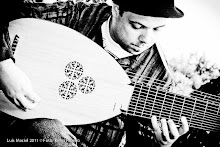 A relatively unknown lute composer is Bálint Bakfark (Valentin Bakfark), 1507-1576). Born in Hungary, Bakfark was a very influencial lutenist during his time, and recognized as a virtuoso of his instrument, and his services were disputed by wealthy European Courts.
A relatively unknown lute composer is Bálint Bakfark (Valentin Bakfark), 1507-1576). Born in Hungary, Bakfark was a very influencial lutenist during his time, and recognized as a virtuoso of his instrument, and his services were disputed by wealthy European Courts.Born in Braşov, Transylvania (now Romania), he was taken orphan to the Greff family and educated in Buda at the court of János Zapólya, king of Hungary. Bakfark remained there until 1540, although he may have travelled to Italy once during this period. During the 1540s he travelled to Paris, but found the position of king’s lutenist already filled, and so he left for Poland in 1549, where he became Court lutenist of Sigismund Augustus II. From there until 1566 he travelled extensively through Europe, with his fame increasing, but remaining faithful to his employer despite numerous efforts by other monarchs to win his services; the riches received from Sigismund may have affected his decision of remaining connected the Court in Wilno (Vilnius).
It is unknown exactly what happened in 1566, but clearly Bakfark must have done something that provoked the wrath of the king and he almost had no time to escape before the soldiers of polish army ransacked his home and destroyed his possessions. After that, he lived for some time in Vienna, then he returned to Transylvania, but not for long. In 1571 Bakfark went to Padua, Italy, where he remained until his death during the plague of 1576.
As was standard during that time, all the possessions of the plague victims were destroyed by fire, so all his manuscript music was lost.
Despite this terrible loss, a small part of the huge amount of music that Bakfark composed was printed: a common explanation was that the music was very difficult for others to play. His surviving works include ten fantasies, seven madrigais, eight chansons and fourteen motets - all with arrangements in beautiful polyphony for lute solo. Bakfark also transcribed motets by his contemporary composers such as Josquin Desprez, Clemens non Papa, Nicolas Gombert and Orlando di Lasso, arranged for lute.
Bálint Bakfark - Fantasia (Julian Bream 1966)
(português)
Um compositor de alaúde relativamente pouco conhecido é Bálint Bakfark (Valentin Bakfark), 1507-1576). Nascido na Hungria, Bakfark foi um alaúdista muito influencial durante o seu tempo, e reconhecido como virtuoso do seu instrumento, sendo os seus serviços disputados por ricas côrtes européias.
Nascido em Braşov, Transilvânia (hoje Romênia), foi levado órfão à família Greff e educado em Buda, na corte de János Zapólya, rei da Hungria. Bakfark permaneceu lá até 1540, apesar de ter possivelmente viajado a Itália uma vez durante esse período. Durante os anos 1540s viajou para Paris, mas encontrando a posição de alaúdista do rei já preenchida, partiu para a Polônia em 1549, onde se tornou alaúdista da corte de Sigismundo Augusto II. Daí até 1566 viajou extensivamente pela Europa, com a sua fama aumentando, mas permanecendo fiel ao seu patrão apesar dos numerosos esforços de outros monarcas para ganhar os seus serviços; as riquezas a ele agraciadas por Sigismundo podem ter afetado a sua decisão de se manter ligado à Corte em Wilno (Vilnius).
Não se sabe exatamente o que lhe aconteceu em 1566, mas claramente Bakfark deverá ter feito algo que provocou a ira do rei e por pouco não teve tempo para fugir antes que os soldados do exército da Polônia saqueassem a sua casa e destruíssem as suas posses. Após isso, viveu durante algum tempo em Viena, e depois voltou à Transilvânia, mas não por muito tempo; em 1571 foi para Pádua, na Itália, onde se manteve até sua morte durante a peste de 1576.
Como era norma durante esse tempo, todas as posses das vítimas da peste eram destruídas pelo fogo, por isso toda a sua música manuscrita foi perdida.
Apesar dessa perda terrível, uma pequena parte da enorme quantidade de música que Bakfark compôs foi impressa: uma explicação comum era que a música era muito difícil para outros tocarem. Os seus trabalhos sobreviventes incluem dez fantasias, sete madrigais, oito canções e catorze motetos – todos com arranjo em belíssima polifonia para alaúde solo. Bakfark também transcreveu motetos de compositores contemporâneos dele como Josquin Desprez, Clemens non Papa, Nicolas Gombert e Orlando di Lasso, arranjados para o alaúde.



nunca tinha ouvido falar! obrigada pela informação!
ReplyDeletebeijos